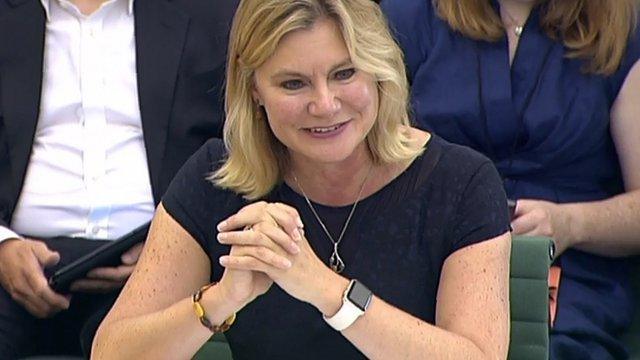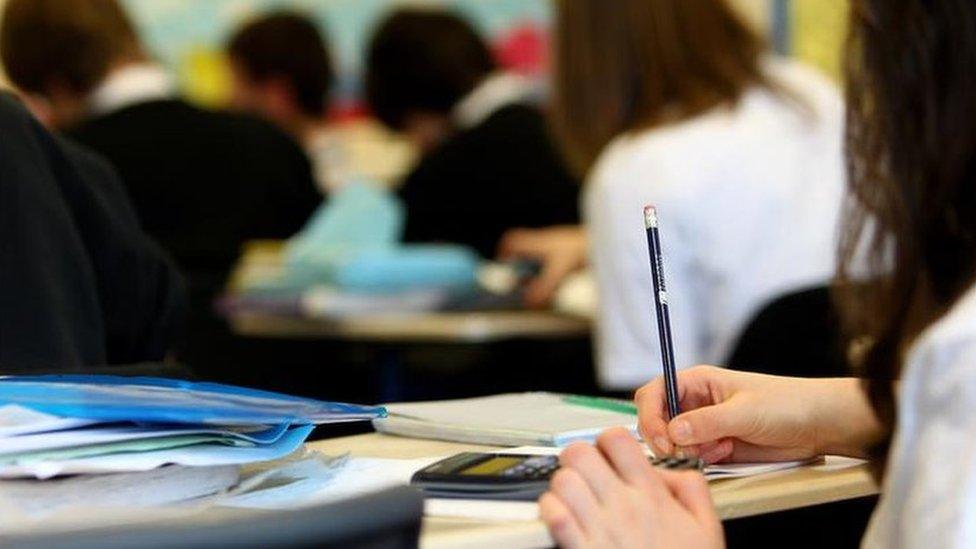'New grammars by 2020' reveal heads after meeting ministers
- Published

Ministers appear ready to press ahead with new grammar schools and expanding selection
The first of a new wave of grammar schools in England could be open by 2020 - the Grammar School Heads' Association has revealed, following a meeting with the education secretary.
Among the options is to admit only the top 10% of the ability range - compared with 25% in many grammar intakes.
There is £150m for short-term bids to create selective places in academies or to expand existing grammars.
The Department for Education confirmed that the meeting had taken place.
But a spokesman says ministers will "respond in the Spring" with their formal grammar school proposals, which will "make more good school places available, to more parents, in more parts of the country".
Top 10% not 25%
The Grammar School Heads' Association has published "key points" of a private meeting with Education Secretary Justine Greening, the prime minister's adviser Nick Timothy and School Standards Minister Nick Gibb.
This included options for:
Brand new grammars from 2020
A national entrance test rather than local tests
Places for the top 10% rather than 25%
£50m per year for more selection in academy trusts or more places in existing grammars
The "Lifting the ban on grammar schools" meeting, described in the association's newsletter, external, examined how new grammar schools could be created and academic selection widened.
It suggests an ambition for a more varied range of schools on offer in England's state system - of which selective and non-selective schools would be a part.

Heads revealed a "Lifting the ban on grammar schools" meeting with Justine Greening
Apart from the headline promise to increase selection, ministers have given few details of what this might mean in practice - so the notes from this meeting reveal more about the type of approach that could emerge.
The head teachers report that entirely new grammar schools could be opened in three years, as part of the free school programme.
But in the short term, selective places could be created within multi-academy trusts or by funding existing grammars to expand, with £50m available per year for three years.
It has been previously suggested that there could be units for talented pupils within schools, or shared between groups of schools, or that individual schools within a chain could be designated as a grammar.
The notes of the meeting also talk of selection being aimed at a much narrower band - the top 10% rather than the top 25% seen as the traditional top ability stream for grammars.
This might fit with suggestions for more highly-specialist, centres of excellence for the most gifted - particularly in sixth form - in areas such as maths and science.
National test
The proposals reported by the grammar school heads also suggest that plans to allow entry for grammar schools at the age of 14 - rather than at the age of 11 - are being ditched as likely to undermine other local schools.
Entry for new grammars could be determined by a national test - rather than allowing a range of separate tests - and there would be an attempt to make the admissions test less susceptible to coaching.
And under discussion is the idea that new grammars should be focused on "opportunity areas" which have been identified as having particular problems with underachievement and poor employment opportunities.
But the heads say that no areas will be excluded from more selection "where there is parental demand".
There are suggestions of a shift in emphasis - with the heads reporting that the push would be on "social reform" rather than "social mobility".
The families seen as "just about managing" would be the priority, the heads suggest, rather than focusing on those families eligible for free school meals.
The head teachers quote Education Secretary Justine Greening as telling them that "the response to the consultation on increasing selection was not 'an overwhelming flood of negativity'".
"Ministers and officials agree with us that there are a lot of people, who are philosophically opposed to selection, who keep saying it damages the education of other pupils but present little or no evidence to support this claim," said the head teachers.
But the grammar school heads have also been forthright in warning ministers of the need to tackle a school "funding crisis".
They have added their voices to complaints from schools about inadequate budgets - with heads speaking of their "great dismay" at the funding levels proposed for many grammar schools.
A Department for Education spokesman, addressing the expansion of selection, said that ministers had "set out plans to make more good school places available, to more parents, in more parts of the country - including scrapping the ban on new grammar school places, and harnessing the resources and expertise of universities, independent and faith schools".
He said the consultation on expanding grammars had prompted "several thousand submissions, which we are now going through. We will respond in the Spring".
- Published4 November 2016
- Published15 September 2016

- Published8 September 2016
- Published15 October 2015
- Published8 September 2016
